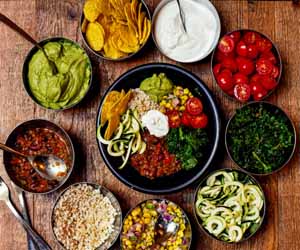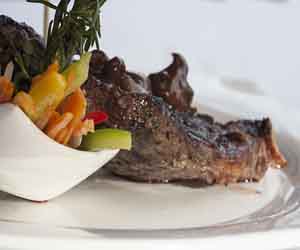

The Art Of Elevating The Dining Experience

Culinary excellence is a term that resonates with connoisseurs and food enthusiasts alike, evoking the highest standards of culinary craftsmanship, innovation, and artistry. It represents the pursuit of perfection in the kitchen, a commitment to creating memorable dining experiences, and a dedication to the craft of food preparation. In this article, we explore the essence of culinary excellence and its significance in the world of gastronomy.
The Ingredients Of Culinary Excellence:
Culinary excellence encompasses a blend of key elements, all of which come together to create unforgettable dining experiences:
1. Creativity And Innovation: At the heart of culinary excellence is creativity. The most celebrated chefs and culinary artists are known for pushing the boundaries, experimenting with flavors, and devising new ways to present familiar ingredients. Innovation drives the evolution of culinary arts, leading to exciting and diverse dishes.
2. Exceptional Skill And Technique: Culinary excellence demands unwavering dedication to honing one's skills. Mastery of various cooking techniques, from sous-vide cooking to knife skills, is essential for chefs and culinary professionals. The artistry in mastering the craft is what sets culinary excellence apart.
3. Quality Ingredients: Superb culinary creations begin with the finest ingredients. Whether it's sourcing organic produce, selecting prime cuts of meat, or hand-picking herbs and spices, using top-quality ingredients is non-negotiable for achieving excellence in cuisine.
4. Attention To Detail: Culinary excellence resides in the details. It's the meticulous presentation of a dish, the perfect balance of flavors, and the precise cooking times that elevate a meal from ordinary to extraordinary. Every element on the plate contributes to the overall experience.
5. Passion And Dedication: Without a deep-seated passion for food and a relentless dedication to the craft, achieving culinary excellence is a formidable challenge. True culinary artists are driven by their love for the art of cooking and their desire to continually learn and grow.
The Pursuit Of Perfection: Culinary excellence isn't just about creating delicious dishes; it's about delivering exceptional dining experiences. This pursuit of perfection often extends beyond the kitchen to encompass a broader ethos:
1. Guest-Centric Approach: Culinary excellence extends to creating memorable moments for guests. It involves understanding their preferences and dietary needs, providing impeccable service, and ensuring every visit to a restaurant or dining establishment is an unforgettable one.
2. Sustainability And Responsibility: Many culinary experts today incorporate ethical considerations into their work. This includes sourcing ingredients sustainably, reducing food waste, and supporting local communities. Culinary excellence is not just about the present, but also the future of our planet.
3. Continuous Learning: The path to culinary excellence is an ongoing journey. Chefs and culinary professionals continually seek new experiences, explore global cuisines, and remain open to learning from their peers and mentors.
4. Artistry Beyond Taste: Culinary excellence often extends beyond the palate. It can encompass elements such as exquisite plating, the ambiance of the dining space, and the artistry involved in creating a complete sensory experience.
Culinary Excellence And Its Impact: Culinary excellence has a profound impact on our culture, society, and personal lives. It inspires a sense of wonder, joy, and appreciation for the art of cooking. It fosters connections and celebrations, making dining an experience to be savored and shared.
Culinary excellence is a blend of art, science, and passion. It represents the pursuit of perfection, an unyielding commitment to the craft, and a desire to create extraordinary dining experiences. As we celebrate culinary excellence, we honor the creativity and dedication of those who make our meals not just sustenance but a form of art and an expression of love.
Embracing A Gluten-Free Lifestyle
 Treatment With A Gluten-Free Diet
Treatment With A Gluten-Free Diet
The cornerstone of celiac disease treatment is the complete elimination of gluten from the diet. A gluten-free diet helps to prevent the autoimmune response and allows the small intestine to heal. When followed diligently, it can lead to symptom resolution and improved overall health.
Challenges Of A Gluten-Free Lifestyle
While a gluten-free diet is the only effective treatment for celiac disease, it presents numerous challenges:
Label Reading: Learning to decipher food labels and identify sources of hidden gluten can be overwhelming.
Cross-Contamination: Avoiding cross-contamination is crucial, as even trace amounts of gluten can trigger symptoms.
Social Situations: Navigating social gatherings and dining out can be challenging, as it often requires clear communication about dietary restrictions.
A Delicious Journey Back To The Source
 Support For Local Farmers: Farm-to-table dining supports local farmers and strengthens the regional economy. Local farmers are often small-scale, family-owned businesses, and by purchasing their produce, consumers help maintain the livelihood of these farmers.
Support For Local Farmers: Farm-to-table dining supports local farmers and strengthens the regional economy. Local farmers are often small-scale, family-owned businesses, and by purchasing their produce, consumers help maintain the livelihood of these farmers.
Sustainability: The farm-to-table movement champions sustainability in agriculture. Farmers who engage in this practice tend to use eco-friendly, responsible farming methods that prioritize soil health, reduce the use of harmful chemicals, and minimize carbon emissions associated with food transportation.
Community Connection: Farm-to-table restaurants often foster a strong sense of community. Diners have the opportunity to meet the people responsible for growing their food, forging meaningful connections between producers and consumers.
From Uncertainty To Culinary Confidence
 Exploring And Experimenting: As kitchen novices grow in confidence, they naturally gravitate towards exploration and experimentation. Trying out new recipes and different cooking methods becomes an exciting adventure. There's a sense of wonder in discovering how ingredients interact and how flavors meld together. The kitchen evolves from a place of intimidation to one of creative expression.
Exploring And Experimenting: As kitchen novices grow in confidence, they naturally gravitate towards exploration and experimentation. Trying out new recipes and different cooking methods becomes an exciting adventure. There's a sense of wonder in discovering how ingredients interact and how flavors meld together. The kitchen evolves from a place of intimidation to one of creative expression.
Building Culinary Confidence: Culinary confidence is a gradual byproduct of this journey. It's the point where kitchen novices realize that they have not only acquired skills but also developed a passion for cooking. The satisfaction of preparing a delicious meal or mastering a challenging dish is immensely rewarding. Kitchen novices begin to relish the act of cooking and take pride in serving their culinary creations.
Culinary Evolution: The beauty of being a kitchen novice is that it's a phase that eventually gives way to culinary expertise. Novices become more skilled, more daring, and more passionate about cooking. The once-daunting kitchen becomes a realm of comfort and creativity.
Nourishing The Spirit With Every Bite
 The beauty of soul-soothing dishes is that they transcend borders and cultures. While the specific recipes may differ, the concept of comforting food is universal. In the United States, it might be a plate of buttery mashed potatoes and gravy. In Japan, it could be a simmering bowl of miso soup. In India, a fragrant pot of dal and rice. The world is filled with these culinary hugs that have been perfected over generations.
The beauty of soul-soothing dishes is that they transcend borders and cultures. While the specific recipes may differ, the concept of comforting food is universal. In the United States, it might be a plate of buttery mashed potatoes and gravy. In Japan, it could be a simmering bowl of miso soup. In India, a fragrant pot of dal and rice. The world is filled with these culinary hugs that have been perfected over generations.
Soul-soothing dishes hold a special place in the hearts of many not only because of their delectable flavors but because they provide a sense of belonging and security. These are the meals that a loved one might prepare when you're feeling under the weather or after a challenging day. The aroma of a soul-soothing dish simmering on the stove is often enough to ease stress and bring comfort.
Moreover, the process of preparing soul-soothing dishes can be a form of therapy in itself. The act of chopping, sautéing, and stirring can be meditative, providing a sense of calm and mindfulness. Creating a comforting dish can be a labor of love, an opportunity to pour your heart into something that will not only satisfy your physical hunger but also nourish your soul.
A Taste Of Nostalgia And Culinary Delight

The appeal of classic comfort food extends beyond its sentimental value. These dishes are designed to satisfy not only our physical hunger but also our emotional cravings. Take, for example, a steaming bowl of chicken noodle soup. Its rich, savory broth and tender chunks of chicken soothe the soul and provide a sense of well-being. A slice of warm apple pie with a scoop of vanilla ice cream can transport us to a place of pure joy and indulgence. Whether it's the crispy, golden exterior of fried chicken or the creamy, cheesy layers of lasagna, classic comfort food speaks to our hearts as much as it does to our taste buds.
From Kitchen To Plate
 Nurturing Ingredients: The choice of ingredients can be a powerful source of inspiration. Fresh, seasonal, and locally sourced ingredients often take center stage in the creative process. The urge to transform these ingredients into a delicious meal can drive home cooks to experiment with innovative recipes.
Nurturing Ingredients: The choice of ingredients can be a powerful source of inspiration. Fresh, seasonal, and locally sourced ingredients often take center stage in the creative process. The urge to transform these ingredients into a delicious meal can drive home cooks to experiment with innovative recipes.
Cookbooks And Celebrity Chefs: Cookbooks and celebrity chefs have an enduring influence on cooking inspiration. The well-curated pages of a cookbook or the charismatic presentations of celebrity chefs on television can spark ideas and encourage home cooks to try new recipes and techniques. The artful fusion of flavors and methods can be especially inspiring.
Personal History And Memories: Many of us find inspiration in our personal history and memories. Grandma's apple pie, dad's famous barbecue sauce, or the scent of holiday cookies can transport us back in time, rekindling memories and emotions that inspire us to recreate those beloved dishes.
Creativity As A Driving Force: Cooking inspiration is a powerful force that fuels creativity in the kitchen. It encourages home cooks to think outside the box, experiment with ingredients, and create their unique signature dishes. This experimentation often leads to culinary masterpieces that are deeply satisfying and reflective of the cook's personal style.
From Novices To Seasoned Chefs
 For those new to the culinary world, there is an abundance of resources available to help you learn the basics. Cookbooks, online tutorials, and cooking classes are fantastic tools for building a strong foundation. These resources offer clear and concise instructions that empower novices to recreate delectable meals with ease and confidence.
For those new to the culinary world, there is an abundance of resources available to help you learn the basics. Cookbooks, online tutorials, and cooking classes are fantastic tools for building a strong foundation. These resources offer clear and concise instructions that empower novices to recreate delectable meals with ease and confidence.
Exploring New Horizons: As you gain confidence and experience in the kitchen, culinary expertise opens the door to endless possibilities. You can start experimenting with different ingredients, cooking techniques, and flavor combinations. Trying new recipes and exploring various cuisines becomes a source of joy and adventure. The thrill of creating something new and delicious becomes the driving force for many home cooks.
Healthy Eating And Nourishing Meals: Culinary expertise is not just about creating indulgent dishes. It's also about making informed choices for a healthier lifestyle. From scrumptious breakfast options to satisfying lunches and delightful dinners, a culinary journey can incorporate nutritious and wholesome recipes that enhance your well-being. This ensures that everyone can enjoy the benefits of cooking, from improved health to enhanced culinary skills.
Family And Loved Ones: Cooking is a universal language of love and care. Whether you are cooking for yourself, your family, or your friends, the ability to create delicious and nutritious meals brings people together. Sharing homemade dishes is a source of joy, bonding, and togetherness, making culinary expertise a gift that keeps on giving.
Striking The Right Balance In Modern Life
 Quality As A Cornerstone
Quality As A Cornerstone
On the other hand, quality is an essential aspect of life that affects our satisfaction and long-term well-being. Whether it's the quality of the food we eat, the products we use, or the relationships we foster, the intrinsic value often trumps the allure of convenience. Quality provides lasting enjoyment and a sense of fulfillment.
The Food Conundrum
One area where convenience vs. quality is palpable is in our food choices. Fast food and processed meals are convenient and quick, but they often lack the nutritional value and flavors of freshly prepared, high-quality ingredients. Overindulging in convenience foods can lead to health problems, while a commitment to quality, fresh, and unprocessed foods can promote well-being and a better relationship with what we eat.